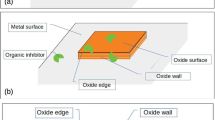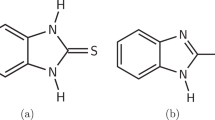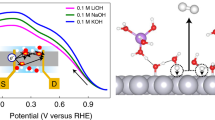Abstract
SEVERAL, years ago1 it was reported that the platinum metals differed in their relative effectiveness in catalysing the corrosion of less noble metals in boiling acids. The purpose of this communication is to point out that the lowered relative effectiveness of particular platinum metals in the presence of ions of a specific, less noble metal may be explained by the formation of an intermetallic compound on the surface of the platinum metal when it is polarized to a potential close to the corrosion potential of the less noble metal. Quantitative experiments on the system, platinum metal–tin–boiling 2 M hydrochloric acid, are cited to support this point of view.
This is a preview of subscription content, access via your institution
Access options
Subscribe to this journal
Receive 51 print issues and online access
$199.00 per year
only $3.90 per issue
Buy this article
- Purchase on Springer Link
- Instant access to full article PDF
Prices may be subject to local taxes which are calculated during checkout
Similar content being viewed by others
References
Buck, III, W. Roger, and Leidheiser, jun., Henry, Nature, 181, 1681 (1958).
Buck, III, W. Roger, and Leidheiser, jun., Henry, J. Electrochem. Soc., 108, 203 (1961).
Author information
Authors and Affiliations
Rights and permissions
About this article
Cite this article
BUCK, W., LEIDHEISER, H. Poisoning of the Surface of Platinum Metals by Intermetallic Compound Formation. Nature 204, 177–178 (1964). https://doi.org/10.1038/204177a0
Issue Date:
DOI: https://doi.org/10.1038/204177a0
Comments
By submitting a comment you agree to abide by our Terms and Community Guidelines. If you find something abusive or that does not comply with our terms or guidelines please flag it as inappropriate.



